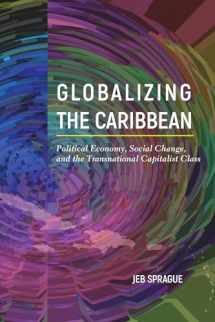
Globalizing the Caribbean: Political Economy, Social Change, and the Transnational Capitalist Class
ISBN-13:
9781439916544
ISBN-10:
1439916543
Edition:
1
Author:
Jeb Sprague
Publication date:
2019
Publisher:
Temple University Press
Format:
Hardcover
350 pages
Category:
Economic History
,
Economics
FREE US shipping
Book details
ISBN-13:
9781439916544
ISBN-10:
1439916543
Edition:
1
Author:
Jeb Sprague
Publication date:
2019
Publisher:
Temple University Press
Format:
Hardcover
350 pages
Category:
Economic History
,
Economics
Summary
Globalizing the Caribbean: Political Economy, Social Change, and the Transnational Capitalist Class (ISBN-13: 9781439916544 and ISBN-10: 1439916543), written by authors
Jeb Sprague, was published by Temple University Press in 2019.
With an overall rating of 4.3 stars, it's a notable title among other
Economic History
(Economics) books. You can easily purchase or rent Globalizing the Caribbean: Political Economy, Social Change, and the Transnational Capitalist Class (Hardcover) from BooksRun,
along with many other new and used
Economic History
books
and textbooks.
And, if you're looking to sell your copy, our current buyback offer is $0.3.
Description
How global capitalism finds new ways to mutate and grow in the Caribbean. The beautiful Caribbean basin is fertile ground for a study of capitalism past and present. Transnational corporations move money and use labor around the region, as national regulations are reworked to promote conditions benefiting private capital. Globalizing the Caribbean offers a probing account of the region's experience of economic globalization while considering gendered and racialized social relations under conditions of the exploitation of workers. Jeb Sprague focuses on the social and material nature of this new era in the history of world capitalism. He combines an historical overview of capitalism in the region with theoretical analysis backed by case studies. Sprague elaborates upon the role of class formation, marginalization, and the restructuring of local states. He considers both U.S. hegemony, and how various upsurges from below and crises occur. He examines the globalization of the cruise ship and mining businesses, looks at the growth of migrant labor and reverse flow of remittances, and describes the evolving role of export processing and supranational associations. In doing so, Sprague shows how transnationally oriented elites have come to rule the Caribbean, and how capitalist globalization in the region occurs alongside shifting political, institutional, and organizational dynamics.


We would LOVE it if you could help us and other readers by reviewing the book
Book review

Congratulations! We have received your book review.
{user}
{createdAt}
by {truncated_author}


